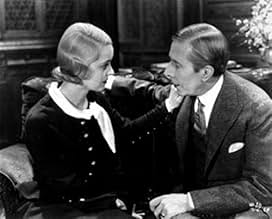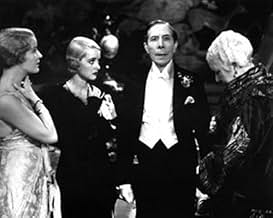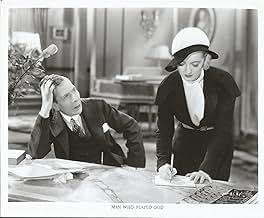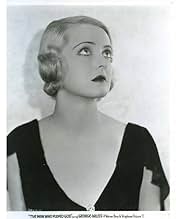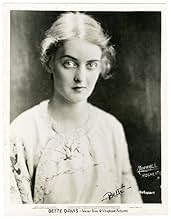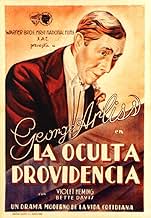IMDb RATING
6.8/10
1.4K
YOUR RATING
After losing his hearing, a musician uses lip-reading to help others.After losing his hearing, a musician uses lip-reading to help others.After losing his hearing, a musician uses lip-reading to help others.
- Awards
- 1 win total
George Arliss
- Montgomery Royle
- (as Mr. George Arliss)
André Luguet
- The King
- (as Andre Luguet)
Ivan F. Simpson
- Battle
- (as Ivan Simpson)
Charles E. Evans
- The Doctor
- (as Charles Evans)
Fred Howard
- Man
- (scenes deleted)
Symona Boniface
- Woman in Audience
- (uncredited)
Wade Boteler
- Detective
- (uncredited)
Elspeth Dudgeon
- Would-Be Ticket Buyer
- (uncredited)
Grace Durkin
- Kit - First Girl
- (uncredited)
Helena Phillips Evans
- Music Fan with Boy
- (uncredited)
6.81.3K
1
2
3
4
5
6
7
8
9
10
Featured reviews
The Sound of Silence
THE MAN WHO PLAYED GOD (Warner Brothers, 1932), directed by John G. Adolfi, from a short story by Gouverneur Morris, stars Academy Award winning actor of 1929s DISRAELI, Mr. George Arliss, in a remake to his 1922 silent screen adaptation. Essentially a showcase for the prestigious Arliss in what might have been just another movie assignment to his credit, it's best known as the motion picture responsible for the advancement of Bette Davis in her first important screen role, following her start at Universal in 1931, thus the beginning of her long association at the Warner studio where she would become its major star attraction before the end of the decade.
Of the George Arliss films in circulation and video today, THE MAN WHO PLAYED GOD holds up remarkably well mainly due to its theme and timely message that never really grows out of date, overlooking the fact that such a story echoes passages from the Holy Bible ("A man who has never suffered has never lived," "If you kill yourself, you'll suffer ten thousand times more" or the age old question, "If God is so merciful, how could he allow this to happen to me?") preached during Sunday services. The title has nothing to do with a actor starring in a religious play, but in fact, about a man whose life becomes an "empty shell" only to change from being a troubled soul after losing his hearing to forgetting his bitterness by helping others. While much of the Arliss movies produced at Warners during the early 1930s were extremely popular, most consist of too much dialog and lack of motion to stir up interest. THE MAN WHO PLAYED GOD is one of those few that doesn't fall into that category thanks to its fine direction, screenplay and supporting players.
The story opens in Paris where 50-year-old Montgomery Royal (George Arliss), a concert pianist, engaged to his protégé, Grace Blaine (Bette Davis), a girl more than half his age, agrees to give a private backstage recital for a monarch. During a performance, an anarchist, intending to assassinate the King (Andre Luguet), explodes a bomb. While everyone has escaped injury, Monty becomes stone deaf. Monte returns to his New York City apartment where he finds it difficult to adjust to his world of silence. He becomes bitter, hating God to a point of canceling his order for an organ he was going to donate to a church in memory of his deaf and religious mother, Margaret Ruth Royal. Without the ability to hear what's precious to him, his music, and becomes an embittered recluse. Coming to the point of suicide by nearly jumping from the window, his loyal butler Battle (Ivan Simpson) saves him in time from eternal suffering by offering him something to occupy his time. Having been taught lip reading, he takes binoculars to spy on people across the street in Central Park, reads their lips, learning of their troubles, and becoming a sort of guardian angel in helping those in desperate need without revealing himself. Finding he now has a purpose in life, he must face another greater challenge involving the loyalty of young Grace.
The supporting cast consists Donald Cook as Harold Van Adam; Louise Closser Hale as Monty's sister, Florence; Oscar Apfel as the Lip Reading Teacher; Paul Porcasi as the Concert Manager; with Hedda Hopper, Murray Kinnell and the unbilled Ray Milland. Of the supporting players, second billed Violet Heming appears to be the least familiar, yet in a role that nearly surpasses the one given by Bette Davis. Her sophisticated mannerisms come close to that of the better known Verree Teasdale, as a widow who secretly loves Monty, in spite of his engagement to another. The Bette Davis trademark is not too much evident at this point, in fact, having the make-up department giving Davis the Constance Bennett manner. Davis would be paired with Arliss one more time in the rarely seen comedy, THE WORKING MAN (1933).
In the midst of horror melodramas, gangsters and pre-code sex dramas playing in theaters at the height of the great depression, THE MAN WHO PLAYED GOD comes as a sort of inspirational drama that offers hope to those who have given up on life, with the moral of the story being, "The Lord works in mysterious ways." Remade by Warners as SINCERELY YOURS (1955) with TV personality Liberace in the role originated by Arliss, whose piano playing served him better than his acting, the latest screen adaptation, that should have improved over the old, didn't, making this 1932 version the one worth viewing. THE MAN WHO PLAYED GOD, which has never been distributed to video cassette or DVD, can be seen on Turner Classic Movies. (***)
Of the George Arliss films in circulation and video today, THE MAN WHO PLAYED GOD holds up remarkably well mainly due to its theme and timely message that never really grows out of date, overlooking the fact that such a story echoes passages from the Holy Bible ("A man who has never suffered has never lived," "If you kill yourself, you'll suffer ten thousand times more" or the age old question, "If God is so merciful, how could he allow this to happen to me?") preached during Sunday services. The title has nothing to do with a actor starring in a religious play, but in fact, about a man whose life becomes an "empty shell" only to change from being a troubled soul after losing his hearing to forgetting his bitterness by helping others. While much of the Arliss movies produced at Warners during the early 1930s were extremely popular, most consist of too much dialog and lack of motion to stir up interest. THE MAN WHO PLAYED GOD is one of those few that doesn't fall into that category thanks to its fine direction, screenplay and supporting players.
The story opens in Paris where 50-year-old Montgomery Royal (George Arliss), a concert pianist, engaged to his protégé, Grace Blaine (Bette Davis), a girl more than half his age, agrees to give a private backstage recital for a monarch. During a performance, an anarchist, intending to assassinate the King (Andre Luguet), explodes a bomb. While everyone has escaped injury, Monty becomes stone deaf. Monte returns to his New York City apartment where he finds it difficult to adjust to his world of silence. He becomes bitter, hating God to a point of canceling his order for an organ he was going to donate to a church in memory of his deaf and religious mother, Margaret Ruth Royal. Without the ability to hear what's precious to him, his music, and becomes an embittered recluse. Coming to the point of suicide by nearly jumping from the window, his loyal butler Battle (Ivan Simpson) saves him in time from eternal suffering by offering him something to occupy his time. Having been taught lip reading, he takes binoculars to spy on people across the street in Central Park, reads their lips, learning of their troubles, and becoming a sort of guardian angel in helping those in desperate need without revealing himself. Finding he now has a purpose in life, he must face another greater challenge involving the loyalty of young Grace.
The supporting cast consists Donald Cook as Harold Van Adam; Louise Closser Hale as Monty's sister, Florence; Oscar Apfel as the Lip Reading Teacher; Paul Porcasi as the Concert Manager; with Hedda Hopper, Murray Kinnell and the unbilled Ray Milland. Of the supporting players, second billed Violet Heming appears to be the least familiar, yet in a role that nearly surpasses the one given by Bette Davis. Her sophisticated mannerisms come close to that of the better known Verree Teasdale, as a widow who secretly loves Monty, in spite of his engagement to another. The Bette Davis trademark is not too much evident at this point, in fact, having the make-up department giving Davis the Constance Bennett manner. Davis would be paired with Arliss one more time in the rarely seen comedy, THE WORKING MAN (1933).
In the midst of horror melodramas, gangsters and pre-code sex dramas playing in theaters at the height of the great depression, THE MAN WHO PLAYED GOD comes as a sort of inspirational drama that offers hope to those who have given up on life, with the moral of the story being, "The Lord works in mysterious ways." Remade by Warners as SINCERELY YOURS (1955) with TV personality Liberace in the role originated by Arliss, whose piano playing served him better than his acting, the latest screen adaptation, that should have improved over the old, didn't, making this 1932 version the one worth viewing. THE MAN WHO PLAYED GOD, which has never been distributed to video cassette or DVD, can be seen on Turner Classic Movies. (***)
A bit old fashioned, but well worth seeing.
This story has been made and remade many times. The first was back in the 1910s as "The Silent Voice". Then, a decade later, George Arliss made "The Man Who Played God"...and then again, a decade after this, Arliss made a sound version. But that wasn't all...in the 1950s, Liberace made "Sincerely Yours"...yet another version of this story!
The story is about a world famous concert pianist (Arliss), a man who is beloved and loves life. He also has a significantly younger woman (Bette Davis) who wants to marry him. But in spite of this, his life takes a sour turn when he is deafened...and sour is the word for it! This is because the pianist soon becomes bitter and resentful from his hearing loss and he spends much of his time brooding. So what is his salvation? See the movie.
Arliss, as usual, is very good. And, the story is a wonderful tale about loss and coping with it. My only complaint, and it's a minor one, is that the story seems a tad old fashioned. Now this does NOT mean I suggest you see the later Liberace version...it's not particularly good. But the 1932 film is well worth seeing...with a great object lesson for us all.
By the way, late in the film look carefully at the minor character of an embezzler...it's played by the soon to be discovered Ray Milland.
The story is about a world famous concert pianist (Arliss), a man who is beloved and loves life. He also has a significantly younger woman (Bette Davis) who wants to marry him. But in spite of this, his life takes a sour turn when he is deafened...and sour is the word for it! This is because the pianist soon becomes bitter and resentful from his hearing loss and he spends much of his time brooding. So what is his salvation? See the movie.
Arliss, as usual, is very good. And, the story is a wonderful tale about loss and coping with it. My only complaint, and it's a minor one, is that the story seems a tad old fashioned. Now this does NOT mean I suggest you see the later Liberace version...it's not particularly good. But the 1932 film is well worth seeing...with a great object lesson for us all.
By the way, late in the film look carefully at the minor character of an embezzler...it's played by the soon to be discovered Ray Milland.
marvelous early Bette Davis
I get so sick of people claiming that Bette Davis wasn't a beauty. She is so lovely in this 1932 film - those huge, gorgeous blue eyes, radiant smile, cute figure - she looks like a doll.
This is a wonderful melodrama which was re-made with, of all people, Liberace years later as "Sincerely Yours." All I can remember about the Liberace film is that he soft-shoed off the stage at the end, and I have a vague impression of him starting to go deaf while playing the piano.
If you can get past that the embalmed-looking George Arliss is supposed to be only 50 years old in this film (he was 64 and looks 80), it should be clear sailing from then on. Arliss was a marvelous actor, and his strong theatrical training is obvious here, as is Davis', with her clipped voice and large gestures. Film as a medium was still being learned by these actors who came from theater.
Man Who Played God is a truly beautiful story about a world-famous pianist who goes deaf and turns against his music and his religious beliefs, only to discover that every tragedy in life has meaning. 73 years later, it's still a great life lesson.
Look for Ray Milland in an uncredited role.
This is a wonderful melodrama which was re-made with, of all people, Liberace years later as "Sincerely Yours." All I can remember about the Liberace film is that he soft-shoed off the stage at the end, and I have a vague impression of him starting to go deaf while playing the piano.
If you can get past that the embalmed-looking George Arliss is supposed to be only 50 years old in this film (he was 64 and looks 80), it should be clear sailing from then on. Arliss was a marvelous actor, and his strong theatrical training is obvious here, as is Davis', with her clipped voice and large gestures. Film as a medium was still being learned by these actors who came from theater.
Man Who Played God is a truly beautiful story about a world-famous pianist who goes deaf and turns against his music and his religious beliefs, only to discover that every tragedy in life has meaning. 73 years later, it's still a great life lesson.
Look for Ray Milland in an uncredited role.
Great story...Pivotal Bette Davis movie
In 1932 many actors were still rather new to sound pictures and the great majority of them were theatre trained and while some would stay on in Hollywood, many would return to the stage to stay. Bette Davis was a young actress in the midst of making that decision to aty in Hollywood or return to New York and the stage. She had made several low buget pictures, but things just were not clicking for her. The success of this movie and the attention she received convinced her to stay on and make movies and we are all thankful for that. George Arliss was a grand old man of the stage and his artistry is well portrayed here. His makeup is a little heavy, making him look a little like the Phantom of The Opera with lipstick and darkened nostrils, but soon you get beyond that. The acting is almost strictly stage-style here, this MUST have been a play before it was filmed. The blocking and angles of the actors and the way they seem to talk "at" each other rather than to each other shows the stage acting. Great story, nice escapism... who wouldnt like to help others? We can do that through George Arliss in this movie.
A unique premise plus the talent of Arliss and Bette Davis
This is an unusual little film starring George Arliss as master concert musician Monty Royale whose young pupil Grace (Bette Davis) confesses her love to him. He's of course flattered but unsure of what the coming years will bring considering their age difference. He agrees to marry her if she feels the same in six months. However, near the beginning of the six month period something happens that leaves Monty unable to enjoy his own music - he is left completely deaf from an explosion. He becomes a bitter man who shuts himself away from everyone. He does take some training in learning to read lips so that he can deal with the world in his new condition, and this training leads him to realize that he now has the means to bring happiness to people in a different and more individualized way than he could as a musician. With the aid of some powerful binoculars left behind by Grace, he can read the lips of the people in the park across the street, learn their troubles, and with his large family fortune and influence, save lives or maybe just bring someone some welcome happiness.
Soon the joy of living has reentered Monty's life, and he is happy that the six month waiting period is soon to end and Grace will be returning from California - they can be wed. He's people watching at his window when Grace suddenly appears in the park across the street. She sits down with someone and begins to have a conversation. Monty "listens in". What will he discover and how will he react? Watch and find out.
In addition to the fine work of George Arliss and Bette Davis, the supporting roles are well played here too. Ivan Simpson is great as Monty's gentleman's gentleman who has no trouble sternly lecturing his master when he needs it, yet is such a formal person that he cannot leave the house -even on an urgent errand - without his hat, and there is even a very small part played by a very young Ray Milland. Highly recommended for fans of early 30's films. It has some precode elements in it, particularly the part where Monty is wrestling with God and his loss of belief, but I would not call it a precode at all.
Soon the joy of living has reentered Monty's life, and he is happy that the six month waiting period is soon to end and Grace will be returning from California - they can be wed. He's people watching at his window when Grace suddenly appears in the park across the street. She sits down with someone and begins to have a conversation. Monty "listens in". What will he discover and how will he react? Watch and find out.
In addition to the fine work of George Arliss and Bette Davis, the supporting roles are well played here too. Ivan Simpson is great as Monty's gentleman's gentleman who has no trouble sternly lecturing his master when he needs it, yet is such a formal person that he cannot leave the house -even on an urgent errand - without his hat, and there is even a very small part played by a very young Ray Milland. Highly recommended for fans of early 30's films. It has some precode elements in it, particularly the part where Monty is wrestling with God and his loss of belief, but I would not call it a precode at all.
Did you know
- TriviaThis was the first movie Bette Davis made under her contract to Warner Bros., the studio under which she did most of her best-known work of the 1930s and '40s. Her earlier six films were made for various studios, (including Universal, RKO and Columbia) all of which let her go.
- GoofsWhen Royle goes to his desk after observing the couple in the park, the shadow of the boom microphone dips onto the window curtain behind him.
- Quotes
Grace Blair: You're my ideal!
Montgomery Royle: I shall always be... your friend.
- ConnectionsFeatured in Hollywood: The Great Stars (1963)
- SoundtracksFantaisie-Impromptu in C sharp minor, Op. 66
(1834) (uncredited)
Written by Frédéric Chopin
Played on piano by George Arliss (dubbed by Salvatore Santaella) at the concert
Details
- Release date
- Country of origin
- Languages
- Also known as
- Covek koji se dopao Bogu
- Filming locations
- Production company
- See more company credits at IMDbPro
Box office
- Budget
- $237,000 (estimated)
- Runtime
- 1h 20m(80 min)
- Color
- Sound mix
- Aspect ratio
- 1.37 : 1
Contribute to this page
Suggest an edit or add missing content

